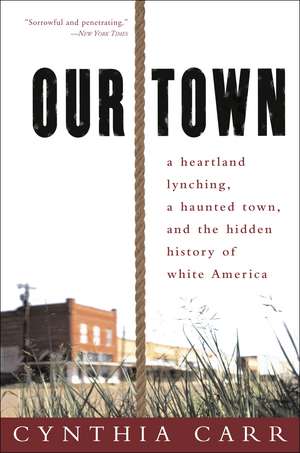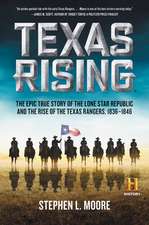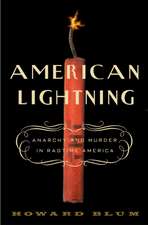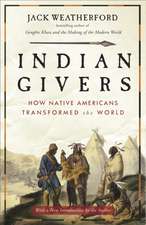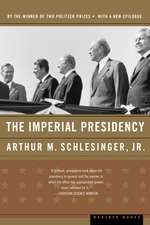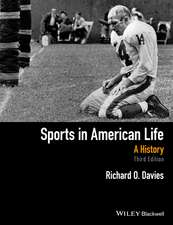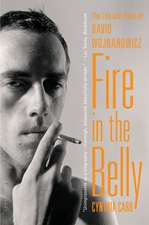Our Town: A Heartland Lynching, a Haunted Town, and the Hidden History of White America
Autor Cynthia Carren Limba Engleză Paperback – 28 feb 2007
Marion is our town, America’s town, and its legacy is our legacy.
Like everyone in Marion, Carr knew the basic details of the lynching even as a child: three black men were arrested for attempted murder and rape, and two of them were hanged in the courthouse square, a fate the third miraculously escaped. Meeting James Cameron–the man who’d survived–led her to examine how the quiet Midwestern town she loved could harbor such dark secrets. Spurred by the realization that, like her, millions of white Americans are intimately connected to this hidden history, Carr began an investigation into the events of that night, racism in Marion, the presence of the Ku Klux Klan–past and present–in Indiana, and her own grandfather’s involvement. She uncovered a pattern of white guilt and indifference, of black anger and fear that are the hallmark of race relations across the country.
In a sweeping narrative that takes her from the angry energy of a white supremacist rally to the peaceful fields of Weaver–once an all-black settlement neighboring Marion–in search of the good and the bad in the story of race in America, Carr returns to her roots to seek out the fascinating people and places that have shaped the town. Her intensely compelling account of the Marion lynching and of her own family’s secrets offers a fresh examination of the complex legacy of whiteness in America. Part mystery, part history, part true crime saga, Our Town is a riveting read that lays bare a raw and little-chronicled facet of our national memory and provides a starting point toward reconciliation with the past.
On August 7, 1930, three black teenagers were dragged from their jail cells in Marion, Indiana, and beaten before a howling mob. Two of them were hanged; by fate the third escaped. A photo taken that night shows the bodies hanging from the tree but focuses on the faces in the crowd—some enraged, some laughing, and some subdued, perhaps already feeling the first pangs of regret.
Sixty-three years later, journalist Cynthia Carr began searching the photo for her grandfather’s face.
From the Hardcover edition.
Preț: 149.82 lei
Nou
Puncte Express: 225
Preț estimativ în valută:
28.67€ • 29.93$ • 23.67£
28.67€ • 29.93$ • 23.67£
Carte disponibilă
Livrare economică 25 martie-08 aprilie
Preluare comenzi: 021 569.72.76
Specificații
ISBN-13: 9780307341884
ISBN-10: 0307341887
Pagini: 501
Ilustrații: 8-PAGE B&W INSERT
Dimensiuni: 157 x 234 x 28 mm
Greutate: 0.51 kg
Editura: Three Rivers Press (CA)
ISBN-10: 0307341887
Pagini: 501
Ilustrații: 8-PAGE B&W INSERT
Dimensiuni: 157 x 234 x 28 mm
Greutate: 0.51 kg
Editura: Three Rivers Press (CA)
Notă biografică
Cynthia Carr was for many years an arts writer for The Village Voice, writing as C.Carr. She lives in New York.
From the Hardcover edition.
From the Hardcover edition.
Extras
ONE
My Marion
I was an adult before I ever saw the picture. But even as a girl, I knew there’d been a lynching in Marion, Indiana. That was my father’s hometown. And on one of many trips to visit my grandparents, I heard the family story: the night it happened back in 1930, someone called the house and spoke to my grandfather, whose shift at the post office began at three in the morning. “Don’t walk through the courthouse square tonight on your way to work,” the caller said. “You might see something you don’t want to see.” Apparently that was the punchline—which puzzled me. Something you don’t want to see. Then laughter.
I now know that, in the 1920s, Indiana had more Ku Klux Klan members than any other state in the union—from a quarter to a half million members—and my grandfather was one of them. Learning this after he died, I couldn’t assimilate it into the frail Grandpa I’d known. Couldn’t assimilate it at all and, for a long time, didn’t try. He was an intensely secretive man, and certainly there had been other obfuscations. He always said, for example, that he was an orphan, that his parents had died when he was three. I accepted this, but the grown-ups knew better. After Grandpa’s funeral, my father discovered a safe deposit box and hoped at last to find a clue to the family tree. Instead he unearthed this other secret: a Klan membership card. All my father said later was “I never saw a hooded sheet. He’d go out. We never knew where he was going.”
Much of this story is about shame. My grandfather was illegitimate, a fact that someone born in small-town Indiana in 1886 would rather die than discuss. And so he did. But if that particular humiliation seems foreign today, what about the other secret? A lot of us who are white come from something we would rather not discuss. “That’s in the past,” we like to say, as if that did anything but give us another hood to wear.
I was in my late twenties when I first came upon the lynching photo in a book: two black men in bloody tattered clothing hang from a tree, and below them stand the grinning, gloating, proud, and pleased white folks. I couldn’t believe that this was my Marion, the lynching referred to in my family, a tree I’d walked past as a child. I looked anxiously for my grandfather’s face in that photo. Didn’t find it. That was some relief. But he too had gone to the square that night. There’d been something you don’t want to see. Then laughter. And as I began to tell people this story, that was one detail I left out, because it shamed me: there was laughter.
My Marion. As a child, I loved the town. And one thing I loved most was the fact that it had a past, unlike the various midwestern suburbs where I grew up. Directly in front of my grandparents’ house—tall, dark green clapboard with a black stone porch—stood an iron hitching post, a black horse’s head with a ring through its nose. It was no decoration. They’d just never taken it down. They lived with history. And every visit gave me a chance to ask Grandma for the family stories, to page with her through the family album. Somehow I never noticed that all the stories and pictures were my grandmother’s. My grandfather had none.
During one summer vacation when I was nine or ten, I found a brittle yellow newspaper clipping in a desk drawer at my grandparents’ house. The headline said josie carr, and parts of certain lines had been cut out with a razor blade. I walked it into the living room asking, “Who’s Josie Carr?” No one said anything, but Grandpa took the clipping from my hand and left the room. Someone explained then that Josie was his mother. I had just found her obituary. We’d been told that she had died about 1890 “from tuberculosis.” Or perhaps she had died “from grief,” said Aunt Ruth, my father’s sister, who liked brooding on the mystery. For all those years my grandfather kept the obituary, certain facts trimmed out with a razor blade. Then that day he took it from my hand, and no one ever saw it again.
We didn’t know who Grandpa’s father was or why he abandoned Josie. Nor did we know when she died, what killed her, where she was buried—nothing. My grandmother knew everything, of course. But she said, “We don’t talk about it. It makes your grandpa feel very bad.” So we waited till my grandparents were out of earshot before discussing our slender clues.
Aunt Ruth would take the tintypes from the old beige Nabisco box. Many of those pictured were strangers to us. Uncle Rad? Aunt Pet? We couldn’t ask Grandpa. We relied on Aunt Ruth to find the images of Grandpa’s mother: “This is Josie before the tragedy. This is Josie after the tragedy.” Aunt Ruth showed us in the later picture where clumps of Josie’s hair had fallen out. “Maybe someone poisoned her,” my aunt mused. “Maybe someone was trying to get rid of her.”
Aunt Ruth held both possessions of Josie’s that came down to us. One was a locket with a handsome young man’s picture, a date—February 11, 1883—and the words “All twisted up. N” Or was it W? Or H? The other was a letter in different handwriting addressed to “Josie kind Josie” from a P.W.H., Bluffton, Indiana—October 28, 1885. A letter full of nonsense about a dog and “I have no time to write you.” Why had this one letter been saved? She must have received it around the time she became pregnant. My grandpa was born in July 1886.
My aunt was both guardian of these artifacts and the one who most needed to know what they meant. She had a recurring dream about the family mystery—that she and Grandpa were in a mausoleum, watching someone pull out a casket. In real life, of course, Grandpa did his grieving alone. My father and my aunt recalled from childhood that on every Memorial Day he rode the interurban to Gas City, just south of Marion, taking three geraniums to the cemetery. We guessed that Josie must be buried there. He, of course, never said.
Aunt Ruth would tell us the story about applying for a job in a Marion furniture store, how Grandma had warned her, “They’ll only want to talk to you about your family.” And sure enough, the man interviewing her said, “Young lady, do you know who your grandfather is?”
Then Aunt Ruth would recount the words of her long-dead auntie Mame: “Could you ever forgive us for what we did?” But Aunt Ruth never knew who “us” referred to or why they needed her forgiveness. “I guess I was brought up not to ask questions,” she said.
We had a drawing my grandfather did as a child—a palatial sort of Victorian mansion. At the bottom he had signed his initials: E.R. His name was Earl Carr. He’d taken his mother’s last name. But clearly he’d known from boyhood who his father was, and he’d imagined taking that identity. Young Mister R.
Finally on his deathbed Grandpa told us, “They cheated me. I could have had ten thousand dollars.” That was all he ever said about his secret: They cheated me.
This is Josie before the tragedy. This is Josie after the tragedy. My grandpa was the tragedy. In the first picture we have of him, he is paying for this sin in sad eyes three years old. He was raised by Josie’s mother, his grandma Carr, who ran a boardinghouse in Marion at 18th and Adams. As a boy, my grandfather sat on the lap of the star boarder, Eugene Debs, the great American socialist who organized on behalf of railroad workers. Grandpa loved Debs enough to name my father after him. But he said very little about his childhood. I picked up hints that the grandmother who had raised him was less than kind.
He was always so quiet, so remote. It was part of the family lore: he had never smiled in one photograph in all of his life. He hated cars and never learned to drive. I don’t think he liked what the world had turned into. He took long walks for recreation, one time all the way to Jonesboro and back. Twenty miles. He never let my grandmother have any money and did all the grocery shopping himself: tongue, mush, hominy, green tomatoes to fry, the fatty cuts of meat. He would get up at two a.m. to be at work by three. He worked at the Marion Post Office from 1908 to 1956. There he accumulated a record one thousand days of sick time and gave it back to the government. “To act tough,” said Aunt Ruth.
For a hobby he studied railroad timetables and knew which trains rode on what tracks, every track in America. A little rack of timetables sat next to his favorite chair. I used to see him study, then refold them. He was always walking to the tracks to see a train. I often wondered why he hadn’t worked for the railroad, why he hadn’t simply hopped one of those trains and left Marion. I think he felt obligated to the family that hadn’t abandoned him. And what I finally understood was that he would not take a risk.
Grandpa wore a necktie and long-sleeve dress shirt with cufflinks every day of his life, even in the hottest weather. He owned a single necktie and would wear it till it wore out before he bought another. Such peculiarities made him a figure of intense interest to me as a girl. The way the pleasures had been carefully measured out. Every year he took the family on the same vacation: one day in either Cleveland or Chicago to window-shop and ride the elevated. If we offered him an iced tea or juice, he would specify just how much. “Two fingers,” he’d say. Maybe three. He was a teetotaler who did not allow liquor in the house. Every now and then he made us kids some little milk shakes, served in jelly jars.
He had one living relative, his cousin. We called her Great Aunt Catherine, and I remember how very old she was, how very old her dog, how steep the stair leading up to the ancient house. She had been to Josie’s funeral when she was maybe three—so Aunt Ruth said—but Catherine recalled nothing except being at a church in the country.
Great Aunt Catherine had been like a sister to Grandpa. He dropped out of school after eighth grade to work for Catherine’s father, his Uncle On. That’s how I heard the name, though really his name was Alonzo or Lon. I liked having someone in the family named On. He was Josie’s brother and ran a grocery store in downtown Marion. He’s the one who said of Josie: “When all the other girls were riding sidesaddle, she rode astride and her hair blew in the wind.” It’s the only thing anyone remembers that anyone said of her.
Aunt Ruth didn’t even know her grandmother’s name till she went to see a fortune-teller during World War II, and the fortune-teller said, “I get a Jo or a Josie.” So Aunt Ruth reported this to one of the relatives, who snorted, “Oh, she mentioned that one, did she?” That one. Still unmentionable as the world changed, as Grandpa became a grandpa, as he stooped ever lower with Parkinson’s disease till he was bent nearly double. He shook uncontrollably, and his spine curved. All twisted up. This is Josie before the tragedy. This is Josie after the tragedy. Soon there would be no one who remembered the tragedy.
When Grandpa died, I was seventeen, old enough to see how not-knowing had hurt my father and my aunt. What if my grandfather had realized that, decades after his death, his silence would still reverberate in all of us? I’m not sure even that would have moved him. As he lay dying, I remembered how I’d found that obituary, thus ensuring the loss of our only real clue. I hoped that my grandpa would speak, but all he ever told us was, They cheated me. Lying there in the hospital, he was no different than he’d ever been. Born old in the other century, already a tiny shaking grandpa, he would die still fatherless.
So I had that life for proof, that you could die and still not fix it. And as I grew older, I saw that this, in fact, was the usual story: A life of things unfixed. A whole history of things unfixed.
My father felt free to look for the truth after my grandpa died. It was 1967. For a while he drove to Grant County every weekend, searching for Josie. He never found her. Cemeteries didn’t always keep records in the old days, he’d tell us. Hardly anyone bothered with death certificates. No one knew when she died—or for that matter, when she’d been born. My father found no evidence that she’d ever existed. But it had been there in that clipping, the one cut with a razor blade. My father went to all the little newspapers to look at back issues, but there was no obituary for Josie Carr. In a Gas City graveyard, he found the brother and sister who’d preceded her in death, their names on two sides of the obelisk that marked the plot. We speculated that Josie was there too but unmarked. My father checked all the cemeteries. He talked about getting caretakers to stick long steel rods in the ground. He explained that if they hit an air pocket, a body had been there once, in a pine box—both turned to nothing now. “Might have been her,” my dad would say. I didn’t ask him how he’d know the right air. He wasn’t really looking for the dust she’d become. He wanted her story. And if he got just the very last page—the scene with the preacher’s incantation and the coffin lifted slowly from the back of a wagon—that would have been something. He could have said, Here’s where they stood once: my family, my great-greats, the people who knew all the things that were kept from me.
It was Great Aunt Catherine who finally told us something. My father and my aunt had assumed that she wouldn’t. They’d known her all their lives, after all, and she’d never said a word. But when Aunt Ruth finally blurted out “Who is our grandfather?” the old woman replied, “Don’t you know that?”
From the Hardcover edition.
My Marion
I was an adult before I ever saw the picture. But even as a girl, I knew there’d been a lynching in Marion, Indiana. That was my father’s hometown. And on one of many trips to visit my grandparents, I heard the family story: the night it happened back in 1930, someone called the house and spoke to my grandfather, whose shift at the post office began at three in the morning. “Don’t walk through the courthouse square tonight on your way to work,” the caller said. “You might see something you don’t want to see.” Apparently that was the punchline—which puzzled me. Something you don’t want to see. Then laughter.
I now know that, in the 1920s, Indiana had more Ku Klux Klan members than any other state in the union—from a quarter to a half million members—and my grandfather was one of them. Learning this after he died, I couldn’t assimilate it into the frail Grandpa I’d known. Couldn’t assimilate it at all and, for a long time, didn’t try. He was an intensely secretive man, and certainly there had been other obfuscations. He always said, for example, that he was an orphan, that his parents had died when he was three. I accepted this, but the grown-ups knew better. After Grandpa’s funeral, my father discovered a safe deposit box and hoped at last to find a clue to the family tree. Instead he unearthed this other secret: a Klan membership card. All my father said later was “I never saw a hooded sheet. He’d go out. We never knew where he was going.”
Much of this story is about shame. My grandfather was illegitimate, a fact that someone born in small-town Indiana in 1886 would rather die than discuss. And so he did. But if that particular humiliation seems foreign today, what about the other secret? A lot of us who are white come from something we would rather not discuss. “That’s in the past,” we like to say, as if that did anything but give us another hood to wear.
I was in my late twenties when I first came upon the lynching photo in a book: two black men in bloody tattered clothing hang from a tree, and below them stand the grinning, gloating, proud, and pleased white folks. I couldn’t believe that this was my Marion, the lynching referred to in my family, a tree I’d walked past as a child. I looked anxiously for my grandfather’s face in that photo. Didn’t find it. That was some relief. But he too had gone to the square that night. There’d been something you don’t want to see. Then laughter. And as I began to tell people this story, that was one detail I left out, because it shamed me: there was laughter.
My Marion. As a child, I loved the town. And one thing I loved most was the fact that it had a past, unlike the various midwestern suburbs where I grew up. Directly in front of my grandparents’ house—tall, dark green clapboard with a black stone porch—stood an iron hitching post, a black horse’s head with a ring through its nose. It was no decoration. They’d just never taken it down. They lived with history. And every visit gave me a chance to ask Grandma for the family stories, to page with her through the family album. Somehow I never noticed that all the stories and pictures were my grandmother’s. My grandfather had none.
During one summer vacation when I was nine or ten, I found a brittle yellow newspaper clipping in a desk drawer at my grandparents’ house. The headline said josie carr, and parts of certain lines had been cut out with a razor blade. I walked it into the living room asking, “Who’s Josie Carr?” No one said anything, but Grandpa took the clipping from my hand and left the room. Someone explained then that Josie was his mother. I had just found her obituary. We’d been told that she had died about 1890 “from tuberculosis.” Or perhaps she had died “from grief,” said Aunt Ruth, my father’s sister, who liked brooding on the mystery. For all those years my grandfather kept the obituary, certain facts trimmed out with a razor blade. Then that day he took it from my hand, and no one ever saw it again.
We didn’t know who Grandpa’s father was or why he abandoned Josie. Nor did we know when she died, what killed her, where she was buried—nothing. My grandmother knew everything, of course. But she said, “We don’t talk about it. It makes your grandpa feel very bad.” So we waited till my grandparents were out of earshot before discussing our slender clues.
Aunt Ruth would take the tintypes from the old beige Nabisco box. Many of those pictured were strangers to us. Uncle Rad? Aunt Pet? We couldn’t ask Grandpa. We relied on Aunt Ruth to find the images of Grandpa’s mother: “This is Josie before the tragedy. This is Josie after the tragedy.” Aunt Ruth showed us in the later picture where clumps of Josie’s hair had fallen out. “Maybe someone poisoned her,” my aunt mused. “Maybe someone was trying to get rid of her.”
Aunt Ruth held both possessions of Josie’s that came down to us. One was a locket with a handsome young man’s picture, a date—February 11, 1883—and the words “All twisted up. N” Or was it W? Or H? The other was a letter in different handwriting addressed to “Josie kind Josie” from a P.W.H., Bluffton, Indiana—October 28, 1885. A letter full of nonsense about a dog and “I have no time to write you.” Why had this one letter been saved? She must have received it around the time she became pregnant. My grandpa was born in July 1886.
My aunt was both guardian of these artifacts and the one who most needed to know what they meant. She had a recurring dream about the family mystery—that she and Grandpa were in a mausoleum, watching someone pull out a casket. In real life, of course, Grandpa did his grieving alone. My father and my aunt recalled from childhood that on every Memorial Day he rode the interurban to Gas City, just south of Marion, taking three geraniums to the cemetery. We guessed that Josie must be buried there. He, of course, never said.
Aunt Ruth would tell us the story about applying for a job in a Marion furniture store, how Grandma had warned her, “They’ll only want to talk to you about your family.” And sure enough, the man interviewing her said, “Young lady, do you know who your grandfather is?”
Then Aunt Ruth would recount the words of her long-dead auntie Mame: “Could you ever forgive us for what we did?” But Aunt Ruth never knew who “us” referred to or why they needed her forgiveness. “I guess I was brought up not to ask questions,” she said.
We had a drawing my grandfather did as a child—a palatial sort of Victorian mansion. At the bottom he had signed his initials: E.R. His name was Earl Carr. He’d taken his mother’s last name. But clearly he’d known from boyhood who his father was, and he’d imagined taking that identity. Young Mister R.
Finally on his deathbed Grandpa told us, “They cheated me. I could have had ten thousand dollars.” That was all he ever said about his secret: They cheated me.
This is Josie before the tragedy. This is Josie after the tragedy. My grandpa was the tragedy. In the first picture we have of him, he is paying for this sin in sad eyes three years old. He was raised by Josie’s mother, his grandma Carr, who ran a boardinghouse in Marion at 18th and Adams. As a boy, my grandfather sat on the lap of the star boarder, Eugene Debs, the great American socialist who organized on behalf of railroad workers. Grandpa loved Debs enough to name my father after him. But he said very little about his childhood. I picked up hints that the grandmother who had raised him was less than kind.
He was always so quiet, so remote. It was part of the family lore: he had never smiled in one photograph in all of his life. He hated cars and never learned to drive. I don’t think he liked what the world had turned into. He took long walks for recreation, one time all the way to Jonesboro and back. Twenty miles. He never let my grandmother have any money and did all the grocery shopping himself: tongue, mush, hominy, green tomatoes to fry, the fatty cuts of meat. He would get up at two a.m. to be at work by three. He worked at the Marion Post Office from 1908 to 1956. There he accumulated a record one thousand days of sick time and gave it back to the government. “To act tough,” said Aunt Ruth.
For a hobby he studied railroad timetables and knew which trains rode on what tracks, every track in America. A little rack of timetables sat next to his favorite chair. I used to see him study, then refold them. He was always walking to the tracks to see a train. I often wondered why he hadn’t worked for the railroad, why he hadn’t simply hopped one of those trains and left Marion. I think he felt obligated to the family that hadn’t abandoned him. And what I finally understood was that he would not take a risk.
Grandpa wore a necktie and long-sleeve dress shirt with cufflinks every day of his life, even in the hottest weather. He owned a single necktie and would wear it till it wore out before he bought another. Such peculiarities made him a figure of intense interest to me as a girl. The way the pleasures had been carefully measured out. Every year he took the family on the same vacation: one day in either Cleveland or Chicago to window-shop and ride the elevated. If we offered him an iced tea or juice, he would specify just how much. “Two fingers,” he’d say. Maybe three. He was a teetotaler who did not allow liquor in the house. Every now and then he made us kids some little milk shakes, served in jelly jars.
He had one living relative, his cousin. We called her Great Aunt Catherine, and I remember how very old she was, how very old her dog, how steep the stair leading up to the ancient house. She had been to Josie’s funeral when she was maybe three—so Aunt Ruth said—but Catherine recalled nothing except being at a church in the country.
Great Aunt Catherine had been like a sister to Grandpa. He dropped out of school after eighth grade to work for Catherine’s father, his Uncle On. That’s how I heard the name, though really his name was Alonzo or Lon. I liked having someone in the family named On. He was Josie’s brother and ran a grocery store in downtown Marion. He’s the one who said of Josie: “When all the other girls were riding sidesaddle, she rode astride and her hair blew in the wind.” It’s the only thing anyone remembers that anyone said of her.
Aunt Ruth didn’t even know her grandmother’s name till she went to see a fortune-teller during World War II, and the fortune-teller said, “I get a Jo or a Josie.” So Aunt Ruth reported this to one of the relatives, who snorted, “Oh, she mentioned that one, did she?” That one. Still unmentionable as the world changed, as Grandpa became a grandpa, as he stooped ever lower with Parkinson’s disease till he was bent nearly double. He shook uncontrollably, and his spine curved. All twisted up. This is Josie before the tragedy. This is Josie after the tragedy. Soon there would be no one who remembered the tragedy.
When Grandpa died, I was seventeen, old enough to see how not-knowing had hurt my father and my aunt. What if my grandfather had realized that, decades after his death, his silence would still reverberate in all of us? I’m not sure even that would have moved him. As he lay dying, I remembered how I’d found that obituary, thus ensuring the loss of our only real clue. I hoped that my grandpa would speak, but all he ever told us was, They cheated me. Lying there in the hospital, he was no different than he’d ever been. Born old in the other century, already a tiny shaking grandpa, he would die still fatherless.
So I had that life for proof, that you could die and still not fix it. And as I grew older, I saw that this, in fact, was the usual story: A life of things unfixed. A whole history of things unfixed.
My father felt free to look for the truth after my grandpa died. It was 1967. For a while he drove to Grant County every weekend, searching for Josie. He never found her. Cemeteries didn’t always keep records in the old days, he’d tell us. Hardly anyone bothered with death certificates. No one knew when she died—or for that matter, when she’d been born. My father found no evidence that she’d ever existed. But it had been there in that clipping, the one cut with a razor blade. My father went to all the little newspapers to look at back issues, but there was no obituary for Josie Carr. In a Gas City graveyard, he found the brother and sister who’d preceded her in death, their names on two sides of the obelisk that marked the plot. We speculated that Josie was there too but unmarked. My father checked all the cemeteries. He talked about getting caretakers to stick long steel rods in the ground. He explained that if they hit an air pocket, a body had been there once, in a pine box—both turned to nothing now. “Might have been her,” my dad would say. I didn’t ask him how he’d know the right air. He wasn’t really looking for the dust she’d become. He wanted her story. And if he got just the very last page—the scene with the preacher’s incantation and the coffin lifted slowly from the back of a wagon—that would have been something. He could have said, Here’s where they stood once: my family, my great-greats, the people who knew all the things that were kept from me.
It was Great Aunt Catherine who finally told us something. My father and my aunt had assumed that she wouldn’t. They’d known her all their lives, after all, and she’d never said a word. But when Aunt Ruth finally blurted out “Who is our grandfather?” the old woman replied, “Don’t you know that?”
From the Hardcover edition.
Recenzii
"Whatever the ultimate literary verdict on this sorrowful and penetrating but uneven book, I cannot think of a nonfiction author in this country who has so bravely taken up [James] Baldwin's dare. Carr calls her volume "Our Town" without a trace of irony or superiority. While she certainly has no desire to exculpate the murderers of 1930 or their flagrantly bigoted successors today, neither does she intend to condemn them in order to elevate more enlightened whites like herself. Family history has offered her no such luxury." —Samuel G. Freedman, New York Times Book Review
“Cynthia Carr goes deep into the heart of our national darkness—the public ritual of violence we call the lynching. Carr investigates its aftermath in a small town and, page by page, we understand everything that we can, experiencing the shock, the disgust, and the harrowing heartbreak that always attend murder wearing the blues mask of ‘rough justice.’ Carr’s clear-eyed rendering of her quest follows the transformation of that murder from a rumor to a collective act to a disputed fact that sits uneasily in the memory of a community.” —Stanley Crouch, author of The Artificial White Man: Essays on Authenticity
From the Hardcover edition.
“Cynthia Carr goes deep into the heart of our national darkness—the public ritual of violence we call the lynching. Carr investigates its aftermath in a small town and, page by page, we understand everything that we can, experiencing the shock, the disgust, and the harrowing heartbreak that always attend murder wearing the blues mask of ‘rough justice.’ Carr’s clear-eyed rendering of her quest follows the transformation of that murder from a rumor to a collective act to a disputed fact that sits uneasily in the memory of a community.” —Stanley Crouch, author of The Artificial White Man: Essays on Authenticity
From the Hardcover edition.
Descriere
Intensely compelling, "Our Town" is Carr's epic account of a brutal lynching that took place in 1930 in Marion, Indiana, and the town's struggle to forget the events of that terrible night.
